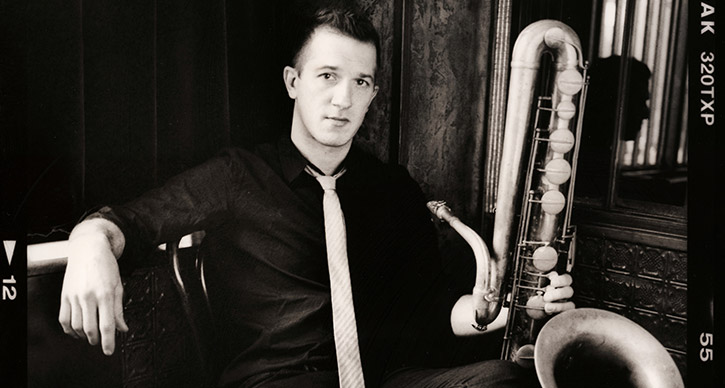Artist Interview: Colin Stetson

Photo: Colin Stetson, who performs in Ann Arbor on April 14, 2018. Photo by Scott Irvine.
In January 2014, saxophonist Colin Stetson performed in Ann Arbor as part of a special week of Renegade performances also featuring performances by the Kronos Quartet. We’re looking back on our chat with Colin to get ready for his return to UMS on April 14, 2018 in Colin Stetson: Sorrow: A Reimagining of Górecki’s Third Symphony.
UMS: Your performances are a part of a “renegade” theme in our season, through which we explore artists and composers who “break the rules” in their own time. How do you feel about the term “renegade”?
Colin Stetson: I don’t think I particularly feel much about it actually. I don’t think about myself or this music in those terms at all.
UMS: How do you think about it?
CS: Well, I think that that terminology kind of implies a certain comparison between inspiration and performative processes of your music to other people’s processes and to the greater whole of music making, and I really don’t function that way when I’m making this music.
If there is any amount of boundary pushing or ground breaking, it’s really more of personal journey and a personal set of goals that I kind of outline for myself. And I’m constantly looking for new ones, and then establishing the pursuit of said goals. So it’s much more of an intimate and insular process in my case.
UMS: Are there artists who take a similar approach from whom you take inspiration?
CS: There are artists really across the board from different genres and different eras that I take inspiration from but not necessarily in a process sort of way. I don’t really know that I’ve ever specifically inquired into someone else’s process and then been inspired by that, so much as I am inspired by the finished product, and what that does and their intention, the intention that’s successful, housed in the music that they created, and then transmitted to the listener. So that’s I think more so where I would consciously cite inspiration or influence.
UMS: You have roots in Ann Arbor. Is coming to Ann Arbor special for you?
CS: Of course. It’s where I grew up. So, all the places in Ann Arbor have a little more historical significance for me, in terms of what I’ve done in them. When we grew up, I was playing in the bars throughout campus all through my teens, and then an enormous amount when I was in college. All of those places have a greater lineage for story for me, some much more so than others.
UMS: Last time you performed in Ann Arbor, you played the Blind Pig, and this time you’ll be performing in more of a theater space. Does the venue change your approach to the performance?
CS: Very much so. One of the things that I’ve been really lucky with in my career is having this extremely disparate selection of venues that I play at. Throughout a tour I can be playing at jazz venues and little clubs, rock venues, some very large, and churches, proper theaters.
So there’s been an enormous amount of different venues, and they’re all very specific in how they accept sounds and how they reflect sound and how they treat an audience, how an audience feels in that space, whether they feel attentive and intimate or exposed, or whether it’s a loud space where there is much more extraneous noise.
A rock club doesn’t necessarily feel better or worse, but there are just differences. There I can rely more on the sheer mass of sound because that’s kind of the domain of the rock club, is moving a lot of air, moving a lot of sound, and filling up in that way. And in a theater, where the convention is more along the lines of sitting very quietly, shunning all extraneous noise, exposing all the minutia, I’m really able to exploit that.
UMS: Kronos Quartet is also a part of our renegade week of performances. Do you like that group’s work? What makes that work stand out?
CS: They were hugely formative for me and my friends when we were coming up. We met in the university, and we were training largely classically, and sometimes academia tends to compartmentalize to such a degree when it comes to genre and idiom, so you know, here is the improvising group, and here is the classical ensemble, and here is the jazz ensemble, and everything is really toeing the line.
But what we were really interested in was just music that came very intuitively to us because we were listening to improvised music, because we were listening to soul and R&B, because we were listening to metal, the music that came out of us tended to be an amalgam of all of that, a much more organic mixture.
And here was a group, Kronos Quartet, who was doing just that. They were forging a path that was not pre-established or genre-specific, and doing it in such an incredible way, they’re such brilliant artists and technicians. It was a great example for young players, and continues to be, musically, for me and my friends now.
Interested in learning more? Check out our Colin Stetson listening guide “Wild Forces at Play.”






